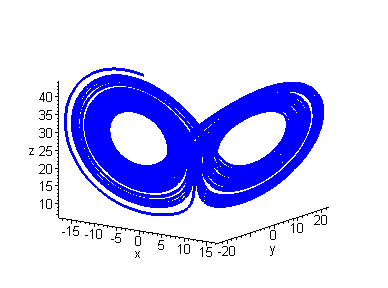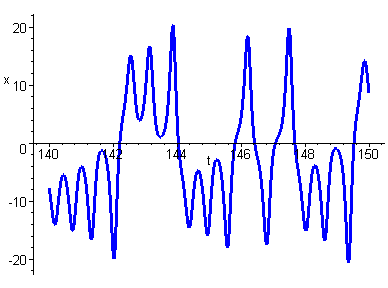
The celebrated dynamical system due to Lorenz
which describes the motion of a fluid in a horzontal layer which is being
heated from below has the form

where x represents the velocity,
y
and z the temperature of the fluid and ![]() are positive parameters determined by the heating of the fluid, the physical
properties of the fluid and the height of the layer.
are positive parameters determined by the heating of the fluid, the physical
properties of the fluid and the height of the layer.
The equilibrium points of the system are

The equilibrium point at the origin is stable if ![]() and unstable if
and unstable if ![]() .
.
The other two equilibrium points, which only exist if ![]() are stable if
are stable if ![]() and unstable if
and unstable if ![]() where
where
![]()
![]()
for the Lorenz equations.
PHASE SPACE
The original parameter values used by Lorenz were ![]() .
For these values of
.
For these values of ![]() and r the critical value of r is given by
and r the critical value of r is given by ![]() .
.
The plots below show a trajectory and an x v. t time series
plot of the system with initial conditions ![]() .
.


Note that the solution trajectories encircle first one equilibrium point and then the other. This pattern of motion is repeated endlessly with the trajectories being confined to a strange attractor. The time series plot indicates the apparently random nature of the motion.
SENSITIVE DEPENDENCE ON INITIAL CONDITIONS
The plots below show time series plots at ![]() for slightly different initial conditions
for slightly different initial conditions

![]()

![]()
Note that the two plots are completely different despite the very small (0.1%) change in the initial condition for x. This type of behaviour in which a small change in the initial conditions can produce a large change in subsequent values is called sensitive dependence on initial conditions also commonly referred to as the butterfly effect. This is a characteristic of chaotic dynamical systems.
SIMULATION
The link below provides a Java simulation of the system.
Parameter values and initial conditions can be changed.
An alternative series of simulations is available using Maple.